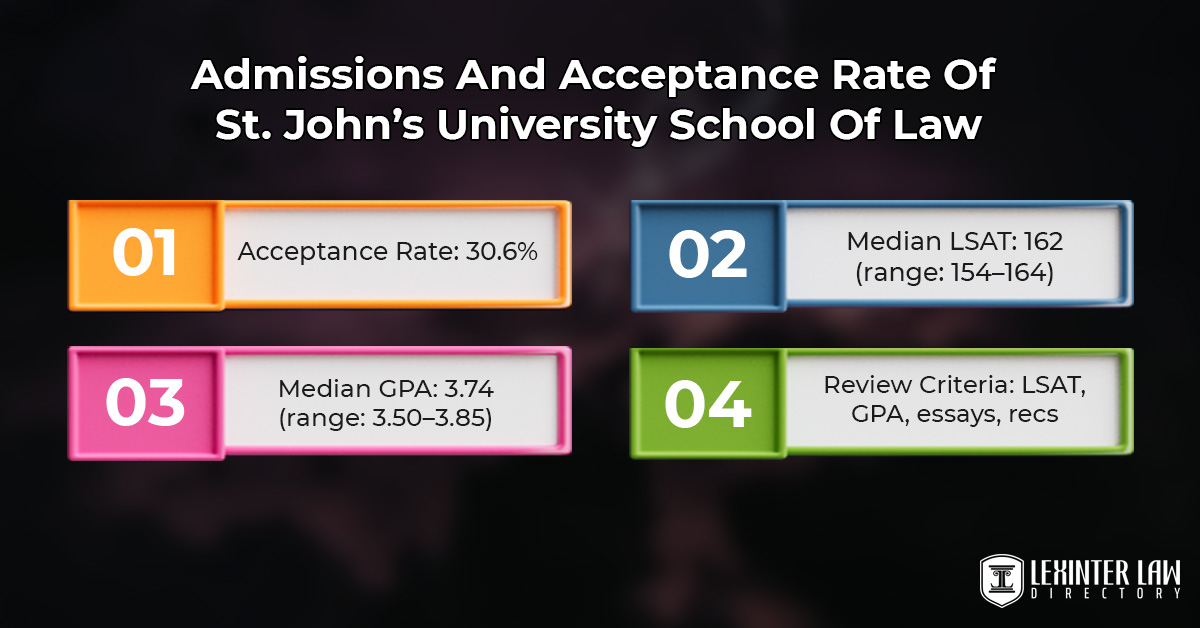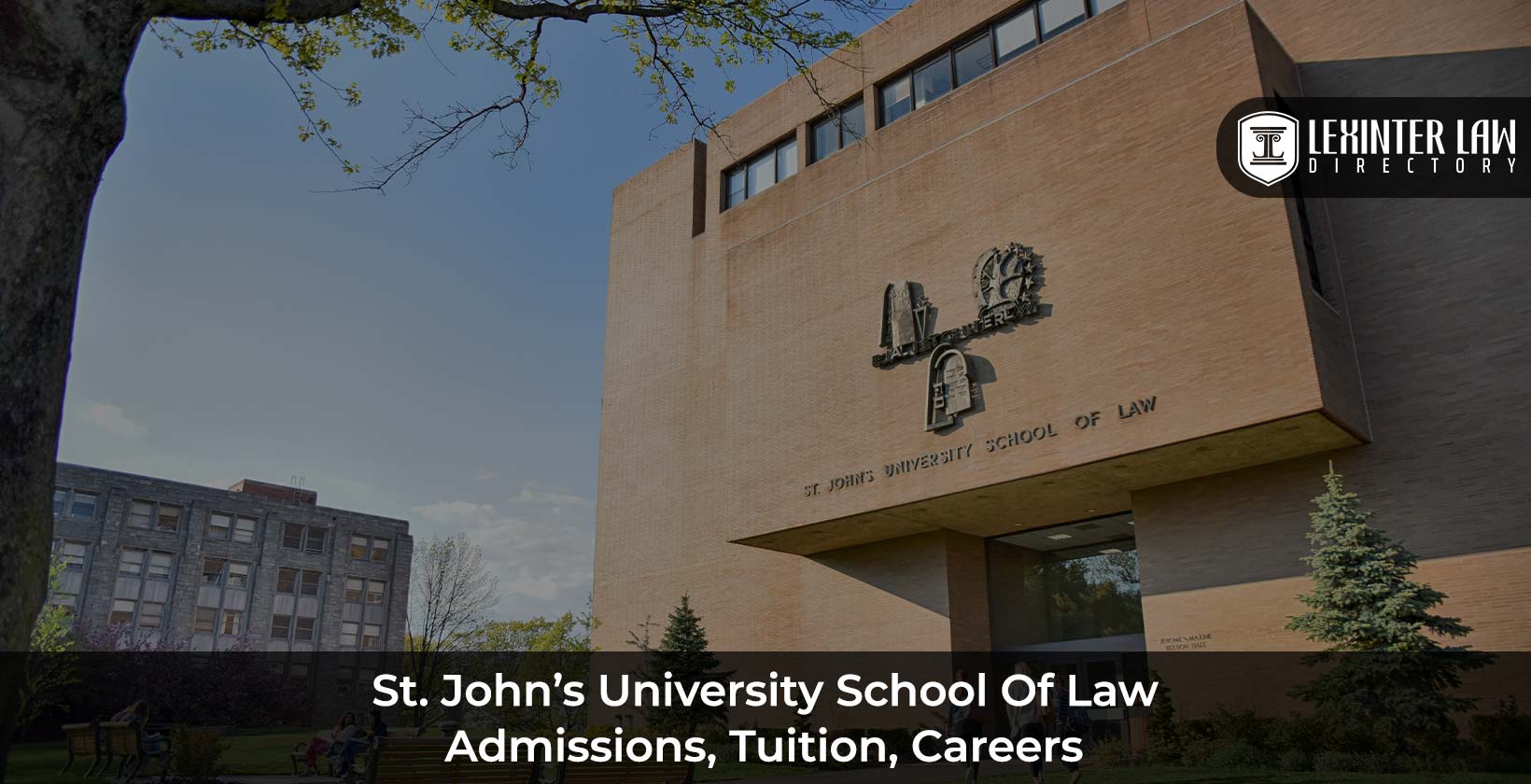St. John’s University School Of Law: Admissions, Tuition, Careers
St. John’s University School of Law, founded in 1925 as part of St. John’s University, is a private, coeducational institution located in New York City. The law school has gained distinction over the years through its unwavering dedication to public interest and social justice.
In this article, we will explore St. John’s University School of Law’s ranking, acceptance rate, location, academic programs, and much more.
Table of Contents
Must Know Facts Of St. John’s University School Of Law
Location And Campus
Situated in Queens, New York City, St. John’s University School of Law benefits from its proximity to one of the world’s foremost legal, business, and cultural hubs. The campus combines traditional and modern architecture and features advanced facilities, including a moot court room, contemporary classrooms, and a spacious law library.
The law school’s location near Manhattan’s legal and business institutions provides students with exceptional opportunities for practical learning experiences. They can readily access internships and externships in diverse legal settings, ranging from top-tier law firms and corporations to public interest organizations and governmental agencies.
Academic Programs And Curriculum
St. John’s University School of Law offers a Juris Doctor program structured to deliver a strong academic grounding alongside hands-on legal training. The program requires completion of 89 credit hours and provides both full-time and part-time flex day options, accommodating students with diverse scheduling needs. The academic experience integrates rigorous coursework with practical opportunities such as externships and co-curricular activities. Students also explore interdisciplinary interests through joint degree pathways, including combinations with business, political science, and advanced legal studies.
The law school supports immersive learning through its extensive clinical program. Ten in-house and partner clinics allow students to engage directly with real clients and legal cases under the supervision of experienced practitioners. Clinics focus on social justice and legal areas, such as child advocacy, criminal defense, prosecution, and refugee representation. The Defense and Advocacy Clinic works with clients facing misdemeanor charges and disciplinary confinement. The Consumer Justice for the Elderly: Litigation Clinic services seniors impacted by housing fraud and debt collection. Clinics such as Economic Justice and Refugee and Immigrant Rights Litigation emphasize service to underrepresented populations. The experiential programs ensure students gain critical insights and courtroom skills necessary for effective law practice. St. John’s University’s law degree, clinics, and clinical programs emphasize real-world impact and community service.
Admissions And Acceptance Rate

St. John’s University School of Law maintains a competitive admissions process, seeking candidates who demonstrate exceptional academic potential, personal achievements, and a deep commitment to justice and ethics. The application process entails submission of LSAT scores, undergraduate transcripts, personal statements, and letters of recommendation.
St. John’s University School of Law had a 30.6% acceptance rate for the 2025 admissions cycle, showing its selective nature. The median LSAT score for enrolled students was 162, and the middle 50% ranged from 154 to 164. The median undergraduate GPA was 3.74, with most admitted students falling between a 3.50 and 3.85 GPA range. The figures highlight strong academic qualifications among incoming students and the law school’s competitive admissions standards.
Tuition Fee And Financial Aid
St. John’s University School of Law sets its 2025 tuition and fees at $74,136, reflecting a 3.45% increase from the previous year’s $71,664. 80.03% of full-time students benefit from grants or scholarships, significantly reducing their overall tuition expenses. The average grant awarded amounts to $70,170, which covers approximately 94.65% of the total tuition and fees. The substantial financial support significantly reduces the cost burden for most students. Grant availability plays a key role in maintaining accessibility and affordability at the law school, helping most students manage their education expenses while pursuing legal training at St. John’s.
Rankings And Reputation
The current St. John’s University School of Law ranking is 63rd in the nation by U.S. News & World Report. The law school ranks No. 25 in Part-time Law programs for 2025. The school stands out in several specialties, including No. 17 in Legal Writing and No. 21 in Trial Advocacy. Additional rankings include No. 57 in Criminal Law, No. 63 in Intellectual Property Law, and No. 78 in Business/Corporate Law. These placements reflect the law school’s academic depth and professional focus.
The law school’s reputation is further solidified by notable achievements, including awards for excellence in clinical legal education and a top ranking for its legal writing program. These accolades serve as a testament to the institution’s dedication to producing competent, ethically grounded, and socially conscious legal professionals.
Career Prospects And Alumni
St. John’s University School of Law boasts an impressive job placement rate, with the majority of graduates securing employment within ten months of graduation. St. John’s University School of Law demonstrates strong outcomes in Bar passage and job placement. The first-time Bar passage rate is 87.1%, exceeding the national average of 82.6%. The school’s ultimate Bar passage rate over two years reaches an impressive 96.7%. St. John’s University School of Law reports that 95.2% of its graduates achieve full-credit employment outcomes within 10 months of graduation. These results highlight the school’s commitment to preparing students for professional success in the legal field.
Graduates pursue various career paths, including positions in law firms, corporate legal departments, government agencies, and public interest organizations. The law school’s vast and influential alumni network comprises graduates who have achieved success across diverse fields. Esteemed judges, politicians, and business leaders count among the notable alumni. Through this network, students have abundant opportunities for internships, clerkships, and networking within the legal community, fostering valuable professional relationships and facilitating successful careers.
FAQ
1. Is St. John’s Law School Considered A Reputable Law School?
St. John’s Law School has established a strong reputation as a reputable institution for legal education. It consistently ranks among the top law schools in the United States and has gained recognition for its commitment to public interest law and social justice.
2. What Is The Average LSAT Score For Admission To St. John’s Law School?
The average LSAT score for accepted students at St. John’s Law School is around 162. However, the admissions process considers various factors, including undergraduate transcripts, personal statements, and letters of recommendation, in addition to LSAT scores.
Conclusion
St. John’s University School of Law is more than a legal education institution; it’s a community dedicated to social justice and public interest. With a comprehensive curriculum, practical learning opportunities, and an inclusive environment, the law school equips students to navigate the complexities of the legal field.
Graduates of this law school carry a strong sense of purpose, using the law to create positive change in various sectors. St. John’s University School of Law fosters ethical legal education and cultivates a new generation of professionals committed to justice and societal impact.

